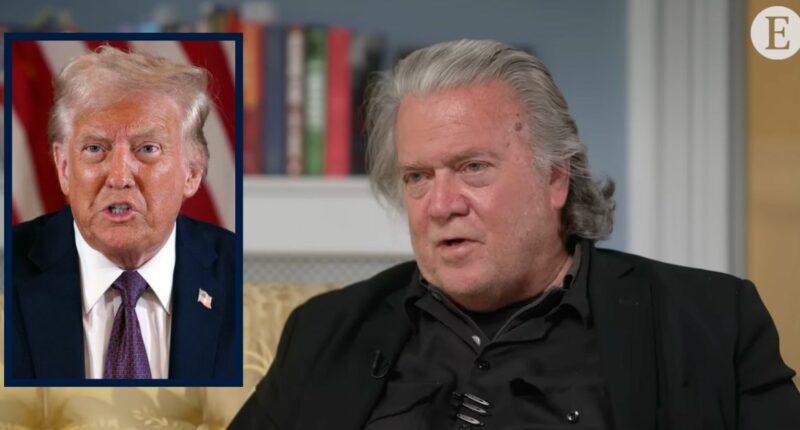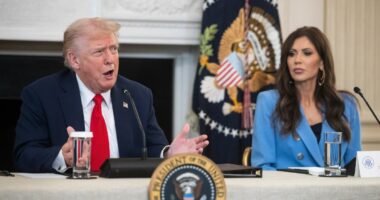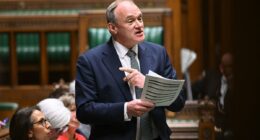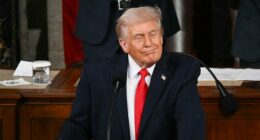Share this @internewscast.com
Left inset: President-elect Donald Trump speaks during a meeting with Republican governors at Mar-a-Lago, Thursday, Jan. 9, 2025, in Palm Beach, Fla. (AP Photo/Evan Vucci). Main: Steve Bannon tells the Economist during an Oct. 23, 2025, interview that Trump will be president again in 2028 (Economist/YouTube).
Supporters of Donald Trump are adamant that he could serve as president for a third time, despite the explicit restriction of the 22nd Amendment, which states, “No person shall be elected to the office of the President more than twice.” This raises questions about the strategies MAGA enthusiasts might be considering to achieve this goal.
After his defeat in the 2020 election, Trump spearheaded a prolonged campaign falsely alleging that the election was stolen and fraught with fraud, claims that were repeatedly dismissed by the courts. Even though Trump publicly stated he would concede if the Electoral College favored Joe Biden, there was a movement to propose “alternate slates of electors” as a countermeasure.
Leading up to January 6, Trump further escalated tensions by incorrectly suggesting to his followers that then-Vice President Mike Pence had the authority to overturn the election results by rejecting “fraudulently chosen electors,” a power Pence did not possess.
Subsequently, Trump secured victory in the 2024 election while continuing to assert that the 2020 election was “Rigged and Stolen.” He remains vocal about this belief, much to the dismay of his critics.
One conservative radio host has dismissed the notion of Trump seeking a third term, suggesting that such speculation is indicative of “mental health concerns,” given that the former president is clearly limited by constitutional term restrictions.
In contrast, Trump himself has not definitively ruled out a third term. On Monday, aboard Air Force One, he told reporters, “I would love to do it,” and added, “Am I not ruling it out? I mean, you’ll have to tell me.” During the same discussion, Trump dismissed the idea of seeking a third term by running as vice president, acknowledging, “I’d be allowed to do that,” but describing the approach as “too cute” and inappropriate for his consideration.
— Erick Erickson (@EWErickson) October 24, 2025
Trump himself, rather than ruling out a third term, instead told the press on Monday on Air Force One, “I would love to do it,” and “Am I not ruling it out? I mean, you’ll have to tell me.” During the same gaggle, Trump ruled out seeking a third term by running as vice president, asserting “I’d be allowed to do that” but adding that that this method is “too cute” and “wouldn’t be right” for him to consider.
The press questions were prompted by an interview former White House chief strategist Steve Bannon gave several days ago to the Economist, in which he heavily teased but did not elaborate on “a plan” to make his former boss’ third term a reality, only saying that he would reveal that plan “at the appropriate time.”
Steve Bannon insists that Donald Trump will be president again for a third term in 2028—and that America needs him to.
Mr Bannon, one of the chief architects of the MAGA movement, spoke to Zanny Minton Beddoes, our editor-in-chief, and Ed Carr, our deputy editor, in Washington,… pic.twitter.com/m0c8RG56Kd
— The Economist (@TheEconomist) October 23, 2025
“He’s gonna get a third term. So, Trump ’28 — Trump is gonna be president in ’28, and people just ought to be accommodated with that,” Bannon stated.
Asked by Economist editor-in-chief Zanny Minton Beddoes, “So, what about the 22nd Amendment?”, Bannon replied: “There’s many different alternatives. At the appropriate time, we’ll lay out what the plan is.”
“We need to finish what we started,” Bannon added, asserting that the “will of the people” installing Trump a third time would be in the spirit of the law.
What could Bannon’s plan be? One way would be a constitutional amendment, as there is currently “no wiggle room” on the issue.
It’s a matter of public record that Rep. Andy Ogles, R-Tenn., has proposed changing the 22nd Amendment to say “No person shall be elected to the office of the President more than three times, nor be elected to any additional term after being elected to two consecutive terms[.]”
Then there is a pro-Trump movement, the Third Term Project, which fully endorses the idea — citing the pre-22nd Amendment four-term presidency of Franklin Delano Roosevelt, which spanned the Great Depression and World War II — and which claims America is “on the precipice of bankruptcy, demographic decline and despair” that Trump alone can stop.
Michigan State University College of Law Professor Brian Kalt is a constitutional scholar who made headlines during Trump’s second failed impeachment — the one for allegedly inciting an insurrection on Jan. 6 — by thoroughly pointing out that the then-former president’s lawyers had misrepresented his work.
Kalt, also one of several law professors who previously joined an amicus brief opposing Trump’s “absolute immunity” arguments at the U.S. Supreme Court, told Law&Crime that the “vice presidential route” that Trump called “too cute” is actually “the most straightforward.”
“So if Trump is ruling that out, the only things that are left that aren’t even ‘cuter’ are extraordinarily heavy-handed, and rather ghastly to contemplate,” Kalt said.
Asked what he meant by “ghastly” scenarios, the professor replied, things like, “simply ignoring the Constitution, suspending the election and rewriting the line of succession.”
While Kalt didn’t see amending the Constitution as a “viable route,” believing there is “no way” Trump “could win 2/3 majorities” in the House and Senate “and get sufficient majorities in 3/4 of the state legislatures” to ratify the amendment, he also noted that FDR “ran and won fair and square” to secure four terms before the ratification of the 22nd Amendment in 1951.
With FDR, there was no invocation of emergency powers — as some on the left fear Trump would invoke to impact federal elections in the 2026 midterms or beyond — and the two-term tradition started by George Washington “was not that strong when FDR ran for his third term, and it wasn’t law,” Kalt said.
“There is no emergency exception to the 22nd Amendment — running for a third term directly would be illegal, period,” he added.
If Republicans were to embrace a constitutional amendment for a third Trump term and somehow succeed, it would theoretically mean that former President Barack Obama could run again.















